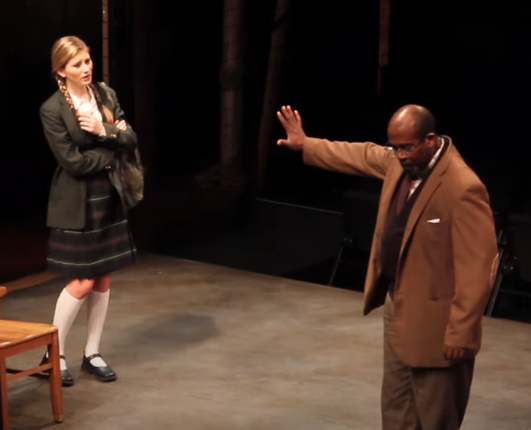Photo AI
Last Updated Sep 13, 2025
Act 2 Analysis Simplified Revision Notes for NSC English FAL
Revision notes with simplified explanations to understand Act 2 Analysis quickly and effectively.
487+ students studying
Act 2 Analysis
Act 2 Overview
- Act 2 deepens the conflict between generations and ideologies.
- Thami fully embraces the student resistance movement, leading to a final confrontation with Mr M.
- The impact of apartheid and the limitations of non-violent resistance become clear.
- The act ends with tragedy, highlighting the cost of political struggle.
Scene 1: Thami and Isabel's Changing Friendship
Summary: What Happens?
- Thami informs Isabel that he can no longer participate in the English competition.
- He explains that he is joining the student boycott against the apartheid education system.
- Isabel struggles to understand, believing that education is a way to success.
- Thami warns Isabel that their friendship cannot continue as before.
Key Themes
- Racial Division – The student movement creates a divide between Thami and Isabel.
- Education vs. Action – Isabel believes in learning, while Thami believes in resistance.
- Friendship and Loss – Their growing ideological differences threaten their bond.
Key Quote
"I can't be your friend anymore, Isabel. Things have changed." – Thami
Scene 2: Mr M's Plea for Peace
Summary: What Happens?
- Mr M urges Thami not to abandon his education.
- He argues that words and knowledge are more powerful than violence.
- Thami accuses Mr M of being out of touch, claiming that education has failed Black South Africans.
- Mr M remains committed to peaceful solutions, despite the rising tension.
Key Themes
- Non-Violence vs. Revolution – Mr M believes in words, Thami believes in action.
- Generational Conflict – Mr M's views clash with the younger generation's demand for change.
- Hope vs. Reality – Mr M refuses to give up on his belief in education, despite the growing violence.
Key Quote
"You can't use the enemy's ideas as a weapon against him." – Thami
Scene 3: The Final Confrontation
Summary: What Happens?
- Mr M reports the students' boycott leaders to the authorities, believing he is protecting them from violence.
- Thami feels betrayed, as Mr M's actions endanger his peers.
- Mr M remains firm in his belief that violence is not the answer.
- Isabel visits Mr M, worried about his safety, but he refuses to flee.

Key Themes
- Betrayal and Consequences – Mr M's decision has dire consequences.
- Moral Dilemmas – He believes he is doing the right thing, but Thami sees it as a betrayal.
- Personal vs. Political Struggle – Mr M's personal beliefs clash with the political reality of apartheid.
Key Quote
"I am a teacher, Isabel! It is the only life I know!" – Mr M
Scene 4: The Tragic Ending
Summary: What Happens?
- Mr M is killed by an angry mob for allegedly betraying the students.
- Thami is devastated but refuses to seek revenge.
- Isabel decides to continue Mr M's legacy by pursuing education and social change.
- The play ends with Thami leaving, uncertain about his future.
Key Themes
- The Cost of Resistance – Mr M's death symbolises the price of political activism.
- Justice vs. Revenge – Thami chooses to walk away instead of seeking vengeance.
- Hope for Change – Isabel represents the possibility of continued progress through education.
Key Quote
"There are some people who will never forgive me for being alive." – Thami
Key Themes in Act 2
- The Power and Limits of Education – Mr M's belief in education is challenged by political realities.
- Violence vs. Peaceful Protest – The struggle between words and action intensifies.
- Racial Division and Betrayal – The student movement fractures relationships.
- The Cost of Apartheid – Mr M's death highlights the brutality of the system.
- Uncertain Futures – Thami's departure symbolises the struggles of young Black South Africans.
Exam Tips
- Be able to identify key quotes and explain their meaning.
- Understand how literary devices (foreshadowing, irony, symbolism) contribute to the message.
- Analyse how Mr M's idealism clashes with Thami's realism.
- Discuss how Act 2 reflects the broader struggles of apartheid South Africa.
- Structure essay responses clearly with introduction, body, and conclusion.
500K+ Students Use These Powerful Tools to Master Act 2 Analysis For their NSC Exams.
Enhance your understanding with flashcards, quizzes, and exams—designed to help you grasp key concepts, reinforce learning, and master any topic with confidence!
540 flashcards
Flashcards on Act 2 Analysis
Revise key concepts with interactive flashcards.
Try English FAL Flashcards56 quizzes
Quizzes on Act 2 Analysis
Test your knowledge with fun and engaging quizzes.
Try English FAL Quizzes29 questions
Exam questions on Act 2 Analysis
Boost your confidence with real exam questions.
Try English FAL Questions27 exams created
Exam Builder on Act 2 Analysis
Create custom exams across topics for better practice!
Try English FAL exam builder57 papers
Past Papers on Act 2 Analysis
Practice past papers to reinforce exam experience.
Try English FAL Past PapersOther Revision Notes related to Act 2 Analysis you should explore
Discover More Revision Notes Related to Act 2 Analysis to Deepen Your Understanding and Improve Your Mastery
